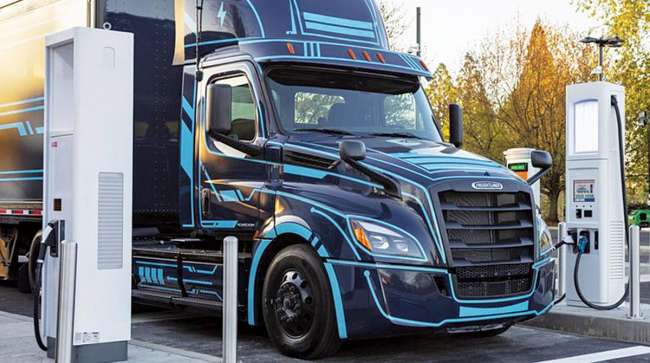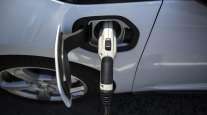Biden Advances Plan to Make Freight Shipping Carbon-Free

[Stay on top of transportation news: Get TTNews in your inbox.]
The Biden administration is laying out more of its vision for decarbonizing the nation’s freight industry, including plans for standardizing charging infrastructure for electric trucks and accelerating the adoption of emission-free big rigs.
The multipronged initiative takes aim at a major source of U.S. greenhouse gas emissions — as well as a thorny challenge for companies trying to meet sustainability targets and cut carbon across their own supply chains. The transportation sector generates about 29% of U.S. greenhouse gas emissions, and the shipment of freight — whether on ships, trucks or rail — is responsible for about a third of that.
The industry’s massive scale and energy needs also make it particularly difficult to decarbonize — a challenge that demands a broad and government-wide approach, said White House National Climate Advisor Ali Zaidi.
“We’ve been playing whack-a-mole as opposed to implementing a systemwide strategy,” he said. “Here we’re finally taking as our goal reliable, cost-effective shipment of goods and trying to decline the emissions associated with that.”
Check out Transport Topics' updated Top 100 list of the largest logistics companies in North America, and explore how the industry's top players have adapted to a tough freight market and are preparing for the future. Tune in above or by going to RoadSigns.ttnews.com.
For the first time, the White House will explicitly establish a national goal for a zero-emissions freight sector. Though it doesn’t come with an express timetable, the ambition is undergirded by other milestones, including a target for 30% of medium- and heavy-duty truck sales to be zero-emission models in 2030.
The White House also is committing to developing a national zero-emission freight strategy that brings together action from across the federal government.
To kick off the initiative, the White House is convening a roundtable April 24 with leaders from across the freight sector — from commercial truck fleet managers and port directors to utility executives and local government officials. The gathering will focus on ways to begin “supercharging the buildout of the infrastructure necessary to make a zero-emissions freight ecosystem a reality in the United States,” according to a White House fact sheet.
Much of the new administration initiatives are voluntary and could be easily undone by a future administration. Former President Donald Trump, the presumptive 2024 Republican nominee, has scoffed at other Biden climate policies and vowed to undo policies compelling electric vehicle sales.
Activists have called on the administration to step up its efforts. They argue that paring pollution from freight transportation will deliver cleaner air, less noise and health benefits for people who live near logistics centers, highways and ports — and now bear the brunt of their pollution.
Want more news? Listen to today's daily briefing above or go here for more info
The federal government will take aim at one obstacle — disparate charging infrastructure — and plans to ask the public to weigh in on minimum standards for the megawatt charging equipment needed to power heavy-duty vehicles.
Separately, the Environmental Protection Agency is opening applications for some $1 billion in Inflation Reduction Act funding to help cities, states and tribes replace school buses, trash trucks and other heavy-duty vehicles with zero-emission models. The money is meant to provide necessary fueling infrastructure and workforce training to enable the transition, with nearly half of the benefits going to communities dealing with significant air pollution.





